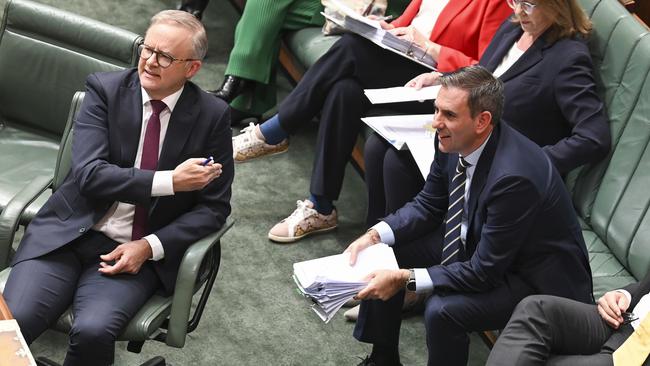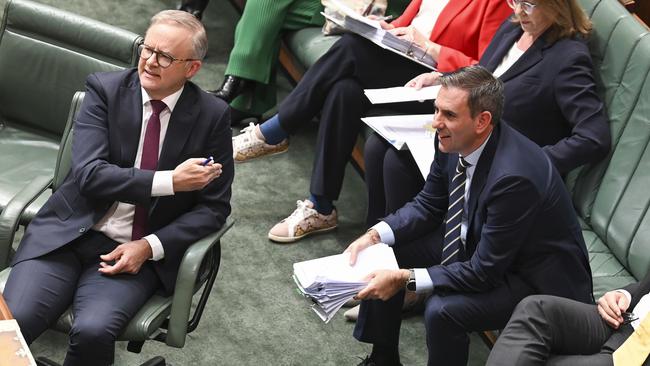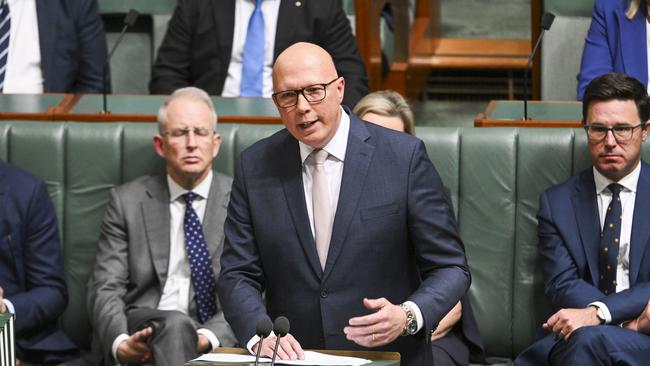
But the unfairness in the detail is now exploding, and increasingly it has the appearance of a re-run of the 2019 election franking credits disaster.
In the lead up to the 2019 election, the ALP was ahead in the opinion polls, but it announced what seemed a simple franking credit tax, but the unfairness in the detail created a total nightmare.
I dubbed it “the retirement and pensioner tax” and the mess was a big part of Scott Morrison’s “miracle victory” in the 2019 election.
The House of Representatives this month is expected to pass what we might call the “no profits tax” bill, but last week the government lost the parliamentary debate, and you could see worried looks among ALP ranks.
Because the industry superannuation funds, have ancient bookkeeping systems, they could not determine members who had balances over $3m in all their funds and could not provide the taxation information for a simple tax. Self-managed funds can provide that information.
To enable industry funds to comply, the government proposed tax on unrealised capital gains, which has sent chilling blows to wide sections of the community and is now starting to raise alarm bells among those not immediately affected but set to be smashed later.

Below are seven groups that will be hit from July 2025 or have every reason to expect future blows:
•Some 17,000 small farmers have their farms in the family superannuation fund and if the value of their farm rises many will have to pay tax on that increased value by selling other assets or borrowing. States with many small farms, like Tasmania, will be the hardest hit. The ALP should not expect to win more seats in Tasmania, and may lose a couple.
•Small businesses, including farmers, have $88bn in direct investment commercial real estate. Usually it is the real estate used by their business. Like the farmers, if the value of their property rises, the family must find the cash to pay the tax on the unrealised gain. Selling the property is not an option unless they want to go out of business. The unindexed tax is a sword at the neck of large areas of small business.
•Three years ago, there were 80,000 Australians with superannuation balances above $3m. That figure has now risen to around 100,000 – an annual growth rate of about 6 or 7 per cent. About 60,000 are in self-managed funds, with the balance scattered between industry and public servant funds. Over a decade, that number will explode.
•Retired public servants in defined benefit funds suddenly have a new tax using a calculation definition that is designed to be impossible to understand. They are extremely angry and that anger is spreading through the corridors of power in Canberra.
One of the independents who will decide whether the legislation is passed is ACT independent David Pocock, who must decide whether to listen to retired public servants.
Meanwhile, there are some seven members of the cabinet who have large superannuation defined benefit entitlements because they have been in parliament for a long time.
Unlike other Australians who must pay tax on unrealised gains, the cabinet ministers carefully framed legislation so they would not pay tax until they retired, and their gains were realised – the reverse of other Australians.
One rule for government politicians on defined benefits and another for everybody else, although Peter Dutton also benefits from the politician protection clauses.

•As I pointed out last month, venture capital and small enterprises need start up funds which carry high risk and are not liquid. Many self-managed funds allocate a portion of their capital to this market, enabling many successful enterprises to be developed. Under the proposed rules, any rise in the value of these high risk businesses will be taxed, which makes investing in such ventures via superannuation totally uneconomic. The government is bragging about fostering made in Australia but is confining that to government and big company backed projects. This is bad policy.
•Because the $3m superannuation trigger point is not indexed, among those girding for future blows are the 225,000 Australians with superannuation balances above $1m. The combination of no indexation and market growth will see most hit $3mn within the next 10 years or so. Those families set to be impacted are now becoming very twitchy. In the parliamentary debate, the Teals appeared set to move an amendment to index $3m. They don’t have the numbers.
•Superannuation is just the first step in the looming dangers for Australians once the principle of taxing unindexed unrealised capital gains is firmly established.
Treasury will be pressing to use the precedent to tax unrealised capital gains on investment houses over a certain unindexed value. From there it’s a small step to the family home.
Taxing unrealised gains has never been part of the tax system of any major developed country. Others know exactly what will happen if they took such a silly step.
In the lower house, the government has the numbers to defeat both the Teals motion to end indexation and the Coalition policy of abandoning the whole tax. In the Senate, the Greens will support the bill if the $3m limit reduced to $2mn and the deferred borrowing rights in superannuation funds is abolished
To pass the bill in the Senate, the government needs the support of the Greens plus two of the independents. It is highly likely that will get that support, but there can be no certainty.
Dutton might have his fingers crossed because if the bill goes through, the chances of a “Dutton miracle victory” are greatly enhanced.







When the government announced it would impose a 30 per cent tax on superannuation members with balances of more than $3m, it looked like a tax that could be sold to voters on the basis of fairness.